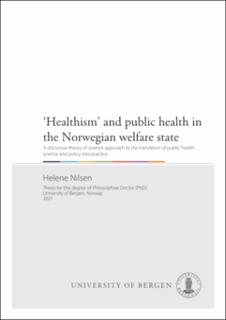| dc.contributor.author | Nilsen, Helene | |
| dc.date.accessioned | 2021-02-01T12:28:43Z | |
| dc.date.available | 2021-02-01T12:28:43Z | |
| dc.date.issued | 2021-02-19 | |
| dc.date.submitted | 2021-01-25T10:45:23.998Z | |
| dc.identifier | container/7b/f9/3d/38/7bf93d38-c92f-4781-826b-80088561ab1c | |
| dc.identifier.isbn | 9788230865330 | |
| dc.identifier.isbn | 9788230861233 | |
| dc.identifier.uri | https://hdl.handle.net/11250/2725574 | |
| dc.description.abstract | This dissertation employs discourse analytic reading strategies in order to examine lifestyle intervention as knowledge practices realizing public health science and policy in the Norwegian welfare state. It addresses a concrete intervention – the Public Health Project in Kindergartens in Grorud Valley, a suburb to the Norwegian capitol Oslo – which was piloted in 2013 and expanded in 2017. The intervention’s objective was to improve diet and physical activity in kindergartens as a means to address issues of social inequity in health. As it is a part of a broader cross-sectoral urban development project addressing living conditions and social equity in Grorud Valley, this intervention constitutes a good instantiating case for studying the comprehensive and social governance of public health. The material studied in this dissertation is particularly suited to address the well-known public health dilemma of navigating social determinants for health on the one hand, and modifying individual habits – lifestyle – on the other. Furthermore, it opens for a discussion of the social welfare state conundrum of state responsibility for the population’s health vis-á-vis values of individual autonomy.
The approach taken in this dissertation is a specific brand of Theory of Science – vitenskapsteori (VT) – as it is practiced at SVT where this dissertation is situated. By examining the intervention in terms of validity, accountability and legitimacy, the objective has been to open up the ‘black box’ of public health work as knowledge practices in order to render its basic assumptions open for general discussion. This is also a means to illuminate broader social implications of these practices. A central focus within the VT approach is the problematization of what knowledge practices can and cannot deliver. This means that a VT approach carries with it a focus on critical reflexivity. In this dissertation, the VT approach to critical reflexivity is also applied on critical scholarship itself.
Paper I) in this dissertation addresses the normative implications of ‘healthism’ as a critical concept and finds that the contextualization of health practices may challenge assumptions inherent to this concept, particularly insofar as ‘healthism’ tends to be connected to a ‘neoliberal rationality’ in critical scholarship. Paper II) examines the meaning of ‘social inequity in health’ (SIiH) as it travels from national public health agendas through local strategies and on to practical realization and evaluation. A central finding is that the complexity and reflexivity promulgated at policy level is lost in translation during implementation. In the intervention, the imperative of addressing SIiH rather comes to justify a knowledge hierarchy where individual values and preferences are in effect subjugated in favor of a particular public health perspective of healthy diet and physical activity. Paper II) also finds that the problem definitions of SIiH changes through administrative levels in a way that makes it difficult to demarcate the parameters for quality and ‘success’. Paper III) addresses the quantification of physical activity as evidence-based practice. Examining the evidence base of the intervention, Paper III) finds that the rationale for quantifying physical activity rests on a coupling between ‘health’ and ‘lifestyle’ established at policy level. A central finding in Paper III) is that the quantification of physical activity is framed interchangeably in two different ways: as ‘evidence-based practice’ and as ‘knowledge production’. In consequence, the validity and accountability of the intervention become elusive.
These findings open for a discussion of a) tensions in quantitative evidence as quality measure, and b) tensions in the governance of social inequity in health in the welfare state. The normative conclusion is that a space for critical reflexivity is needed in public health practice and subsequent evaluation in order to address these tensions. This normative conclusion realizes a problem of self-reference on the part of this dissertation. Therefore, time and space are allocated in the introductory chapter to account for the normativity, limits and prospects of the critical VT approach taken in this work. | en_US |
| dc.language.iso | eng | en_US |
| dc.publisher | The University of Bergen | en_US |
| dc.relation.haspart | Paper I: Helene Nilsen and Jan Reinert Karlsen: “Towards an analytics of healthism – An epistemological discussion of a critical concept”. Full text not available in BORA | en_US |
| dc.relation.haspart | Paper II: Helene Nilsen: The Unstable Meaning of ‘Social Inequity in Health’: a study of a Norwegian public health intervention from political outline to implementation and evaluation. Full text not available in BORA | en_US |
| dc.relation.haspart | Paper III: Helene Nilsen, Merle Jacob, Jan Reinert Karlsen: “To what extent are interventions addressing physical activity in children evidence-based? – A frame analysis of a Norwegian public health project in kindergartens”. Full text not available in BORA | en_US |
| dc.rights | In copyright | |
| dc.rights.uri | http://rightsstatements.org/page/InC/1.0/ | |
| dc.title | ‘Healthism’ and public health in the Norwegian welfare state : A discursive theory of science approach to the translation of public health science and policy into practice | en_US |
| dc.type | Doctoral thesis | en_US |
| dc.date.updated | 2021-01-25T10:45:23.998Z | |
| dc.rights.holder | Copyright the Author. All rights reserved | en_US |
| dc.description.degree | Doktorgradsavhandling | |
| fs.unitcode | 11-75-0 | |
